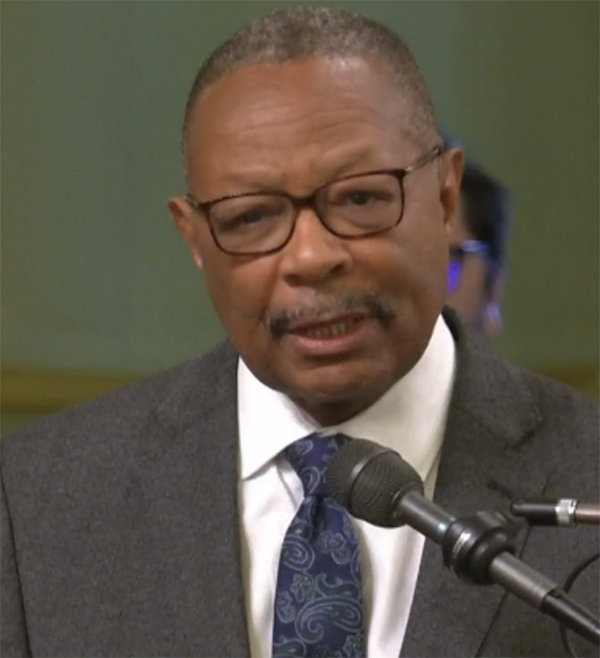By Antonio Ray Harvey
Contributing Writer
SACRAMENTO — California is moving towards officially apologizing for the horrors African Americans endured during chattel slavery after the state Assembly voted unanimously May 16 to approve Assembly Bill 3089.
Authored by Assemblyman Reggie Jones-Sawyer, D-Los Angeles, the California Apology Act for the Perpetration of Gross Human Rights Violations sailed through the Assembly with a 64-0 floor vote.
AB 3089 is one of 14 reparations bills supported by the California Legislative Black Caucus this legislative session.
“Not only is the apology letter important, but it’s also what we do after it becomes law,” Jones-Sawyer said after the legislation passed. “It’s whether or not we go ahead and fulfill the dream of what my ancestors wanted, which is fully to make us part of the American dream. And most importantly, get rid of the river of racism that has been running through our communities for so many decades and centuries.”
Assemblywomen Mia Bonta, D-Alameda, Akilah Weber, D-La Mesa, Tina McKinnor, D-Inglewood, and Assemblyman Corey Jackson, D-Moreno Valley — all members of the Legislative Black Caucus — spoke on the Assembly floor before the vote.
Former Assembly Speaker Anthony Rendon, D-Lakewood, also spoke in support of the legislation.
“This is a statement of our values, this is a statement of who we are and what we think at this moment and that’s why it is so important to all of us,” Rendon said.
Current Assembly Speaker Robert Rivas shared his thoughts about the historical bill. Rivas invoked the words of the Rev. Martin Luther King Jr. from a letter he wrote commending the sacrifice and success of Cesar Chavez after he staged a 300-mile walk from Delano to the State Capitol in 1966.
“As we know, that it is undeniable that our systems of government have been complicit in the oppression of African Americans,” Rivas said. “Our courts, our schools (and) even this Legislature, California history is tarnished by the subjugation of Black people.”
AB 3089 mandates California to recognize and accept responsibility for “all of the harms and atrocities committed by the state, its representatives thereof, and entities under its jurisdiction who promoted, facilitated, enforced and permitted the institution of chattel slavery.”
AB 3089 would require a plaque memorializing the apology and “publicly and conspicuously installed and maintained” in the confines of the State Capitol.
“AB 3089 recognizes the harm that slavery had and continues to have on Black Californians and takes the important step of acknowledging and formally apologizing for the state’s role in harming the descendants of enslaved people,” McKinnor said.
On the Senate side, three of Sen. Steven Bradford’s reparations bills were approved by the Senate Appropriations Committee last week and are expected to get a full vote on the Senate floor.
SB 1403 (formerly SB 490) passed on a 5-2 vote. It would create a new state agency called the California American Freedman Affairs Agency that would oversee the administration of reparations as determined by the Legislature and governor.
“This bill was a recommendation of the California Reparations Task Force, which I spent two years of my life being a part of,” Bradford said. “It’s one of the most essential of the (task force) report’s 115 recommendations.”
Another bill, SB 1050 – Reparations: Restitution for Property Taking – was approved on a 5-2 vote. It establishes a process for the state to review and investigate public complaints from individuals who claim their property was taken without just compensation or as an outcome of racially motivated eminent domain procedure. SB 1050 establishes a process for providing compensation to the rightful owner of the property.
SB 1331 received a 5-2 vote as well. Titled Fund for Reparations, the bill creates a specific fund for Reparations and Restorative Justice in the state treasury for the purpose of funding compensation to eligible Black Californians. The bill would authorize the fund to receive money from any other federal, state or local grant, or from any private donation or grant.
Two other Bradford bills, SB 1013 and SB 1007, died in committee.
SB 1013 proposed the creation of a program designed to make grants available to individuals who currently live in formerly redlined neighborhoods in the state and are descendants of a person enslaved in the United States. SB 1007 calls for providing grants to descendants of enslaved persons to own a home.
SB 1050 was the only reparations bill Bradford authored that was included as part of the Legislative Black Caucus’ 2024 Reparations Priority Bill Package. According to the caucus, the bills in the package are the first step of a multi-year effort to implement the legislative recommendations in the California Reparation Task Force report.
“This is sacred work,” state Sen. Lola Smallwood-Cuevas, Lo Angeles, said of the Black caucus’s efforts. “I see reparations as a way of repairing the foundation which makes us stronger and lifts all of us in the process. I’m grateful to be in the Legislature at this time when we are positioning our state for a different and brighter future for the next generation.”
Antonio Ray Harvey is a reporter for California Black Media.










